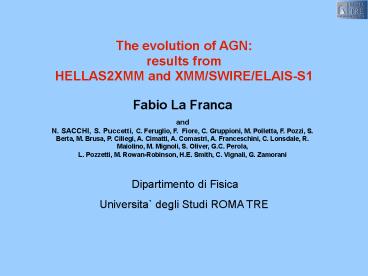Fabio La Franca - PowerPoint PPT Presentation
1 / 21
Title:
Fabio La Franca
Description:
Fabio La Franca. and. N. SACCHI, S. Puccetti, C. Feruglio, F. ... (phot-z included) HARD BAND. 1.5-4 keV. X-ray Chandra ... (phot-z included) SOFT BAND. 0.3 ... – PowerPoint PPT presentation
Number of Views:57
Avg rating:3.0/5.0
Title: Fabio La Franca
1
The evolution of AGN results from HELLAS2XMM
and XMM/SWIRE/ELAIS-S1
Fabio La Franca and N. SACCHI, S. Puccetti, C.
Feruglio, F. Fiore, C. Gruppioni, M. Polletta,
F. Pozzi, S. Berta, M. Brusa, P. Ciliegi, A.
Cimatti, A. Comastri, A. Franceschini, C.
Lonsdale, R. Maiolino, M. Mignoli, S. Oliver,
G.C. Perola, L. Pozzetti, M. Rowan-Robinson, H.E.
Smith, C. Vignali, G. Zamorani
Dipartimento di Fisica
Universita degli Studi ROMA TRE
2
What do we know about the AGN evolution?
A Luminosity Dependent Density Evolution (LDDE)
for X-ray AGN is observed (e.g. Ueda 03 Barger
05 La Franca 05, Gilli 07) Lower luminosity
AGN peak at lower redshifts DOWNSIZING (see
models of galaxy and AGN formations)
La Franca 05
3
What do we know about the AGN evolution?
The fraction of absorbed AGN as function of LX
and z
assumed )
expected
Fraction of Absorbed AGN
) Assuming no luminosity and redshift dependences
4
Fraction of absorbed AGN as function of z
The increase with z is confirmed using X-ray
spectral fits only from CDFS-H2XMM-HBS28-Lockmann-
Piccinotti samples (see also talk of Treister)
The z dependence is evident at any luminosity
The luminosity dependence is evident at any z
5
The synthesis of the X-ray background
The 2-10 keV XRB is reproduced
HEAO1-A2 data (confirmed by BeppoSAX and INTEGRAL)
6
Accretion history of the Universe
Marconi et al. (2004) 4.6 (1.9-1.4) M?
Mpc-3 McLure Dunlop (2004) 2.8 (/- 0.4) M?
Mpc-3
7
The NH column density distributions
assumed
predicted (taking into account selection effects)
observed
We allowed to vary as a function of LX and z the
fraction of un-absorbed AGN with LogNHlt21 We
assumed a flat LogNH distribution in the
21ltLogNHlt26 range (however only LogNHlt24 cm-2
AGN are detectable)
La Franca et al. 05
8
Looking for absorbed AGN in the
XMM/SWIRE/ELAIS-S1 field
Method data
- AREA
- 0.6 deg2 (?0.5h, ?-43.5o)
- IMAGING
- BVRI (PI Franceschini Berta 06)
- JK (PI Cimatti Maiolino)
- SWIRE
- (PI Lonsdale Rowan-Robinson)
- (3.6, 4.5, 5.8, 8.0 and 24 µm)
- X-ray (PI Fiore) by
- XMM 4x100Ks (Puccetti 06)
- Chandra x5
- SPECTROSCOPY
- (PI La Franca)
- 100 hours with
- VIMOS and FORS2
We searched for AGN SED over 400 24?m sources
having spectroscopic redshifts and F24 gt 0.4mJy
9
Looking for absorbed AGN in the
XMM/SWIRE/ELAIS-S1 field
Method SED templates fitting
SAMPLE 400 spec. identified sources with F24gt
0.4 mJy
Adapted from Polletta et al. (2007)
10
Looking for absorbed AGN in the
XMM/SWIRE/ELAIS-S1 field
Method SED templates fitting (see Polletta et
al. 2007)
1st choice
2nd choice
3rd choice
AGN2
AGN1
?2 best fit analysis
Normal
Normal
SED
11
Looking for absorbed AGN in the
XMM/SWIRE/ELAIS-S1 field
Results SED templates fitting
90 of the X-ray selected AGN have a MIR AGN SED
classification
X-ray detected AGN (LXgt1042erg/s)
12
Looking for absorbed AGN in the
XMM/SWIRE/ELAIS-S1 field
MIR color selection techniques miss 30 of the
AGN2
Slide 19
13
Looking for absorbed AGN in the
XMM/SWIRE/ELAIS-S1 field
Results counts
24 µm counts predicted by Silva (04) from AGN
X-ray luminosity function of Ueda (03)
The density of AGN1 agrees with the predictions
14
Looking for absorbed AGN in the
XMM/SWIRE/ELAIS-S1 field
Results fraction of AGN as a function of flux
Brand et al. 2006
15
Looking for absorbed AGN in the
XMM/SWIRE/ELAIS-S1 field
Results stacking of Chandra data of MIR-AGN2
Slide 19
16
Looking for absorbed AGN in the
XMM/SWIRE/ELAIS-S1 field
X-ray Chandra stacked images
The normal MIR galaxies show an X-ray soft
emission while the AGN2 MIR candidates show an
HARD X-RAY SPECTRUM. The hardness ratio implies
an absorbing gas column density
NH1022-23 cm-2 and LX1042 assuming ?1.8
and ltzgt0.7.
17
Looking for absorbed AGN in the
XMM/SWIRE/ELAIS-S1 field
Result which part of the LF are we observing?
X-RAY ABSORBED
Quantitative analyses are under way
X-RAY UN-ABSORBED
La Franca et al. 2005
18
Looking for absorbed AGN in the
XMM/SWIRE/ELAIS-S1 field
Conclusions
-A MIR-SED fitting technique has been developed
to look for type 2 (mainly obscured) AGN
-The MIR-SED fitting technique selects 90 of the
X-ray selected AGN
-The fraction of MIR-selected AGN at F240.5 mJy
is about 25, a factor of two larger than
previously observed.
-Stacking of Chandra data on 166 MIR-AGN2
candidates show a detection of an hard X-ray
spectrum having NH1022-23 cm-2
-We are probing the LX1042,z0.7 part of the LF
of absorbed AGN. Quantitative estimates of their
density are under-way.
Thanks
19
Slide 19
20
Slide 19
21
Slide 19































